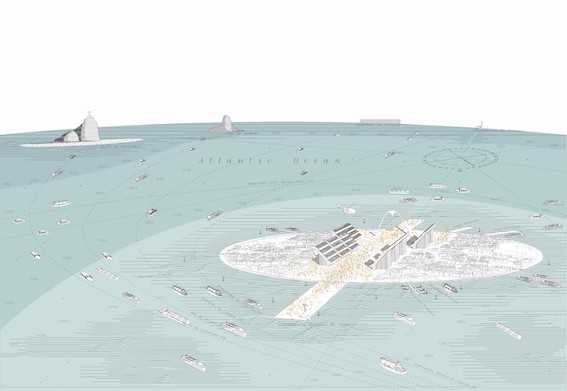A Geographic Stroll Around the Horizon
Rio City Vision Competition, 2013, Honorable Mention
Project Team:
El Hadi Jazairy + Rania Ghosn
Justin Garrison, Dorin Baul, Carla Landa, Jia Weng
“We have an even bigger horizon ahead of us,” notes the major Brazilian oil company on its website after the 2007 discovery of mega-fields in the South Atlantic of Brazil. Opening up the petroleum horizon, the offshore oil basins have constituted a new province within 183 kilometers of the coast of Rio. Although such territory is inscribed in an extensive network of oil blocks, transportation vectors, drilling axes, and labor nodes, the image of the offshore is singularly identified with that of the rig perpetuating an urban imaginary of zones of exception, of isolated platforms beyond environmental and economic accountability.
4.7: A Geographic Stroll Around the Horizon expands the spatial and cognitive imaginary of the city of Rio de Janeiro to its ocean-hinterland. Countering the abstraction of the sea into a logistical zone of capitalist fantasies, the project draws on the horizon as a geographic aesthetic that renders legible the offshore territorial project. Set at a distance of 4.7 kilometers for an observer standing on the Earth's surface, the distance to the visible horizon at sea has been historically important as it represented the maximum range of communication, vision, and knowledge.
The horizon, a geography of our infinite longing, reclaims the political consciousness of the urban and the spatial condition of the ocean by projecting a constellation of urban objects between Rio’s coast and the oil offshore. In a synecdochal strategy, ten of Rio’s most iconic sites are projected into a linear archipelago on the continuous surface of the ocean. Calculated in relation to the optics of vision, the respective distances between urban islands extend the limit of the perceivable in an unobstructed metric space. The archipelago constructs as such a new scale of inhabitation against a figured skyline.
The sea forms a continuous surface for the collective, upon which silhouettes of floating city icons appear along the journey. Around sunset, at the moment when the neon-pink sun slips below the horizon, everyone stops, stands and claps: a nightly salute to city, sea and sky. Such Aristotelians celebrate that philosophy begins in wonder, and that to wonder beyond the horizon –the urge to know beyond the conceivable– is itself the engine of the polis and its civic life.
